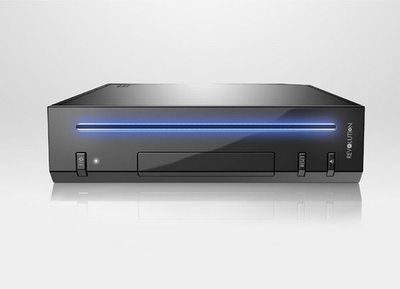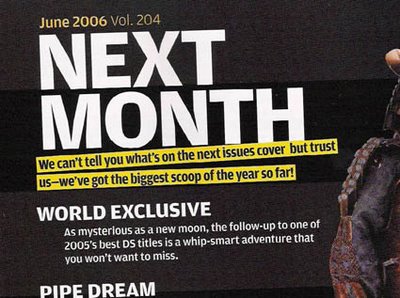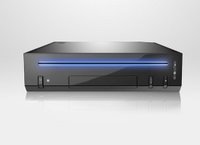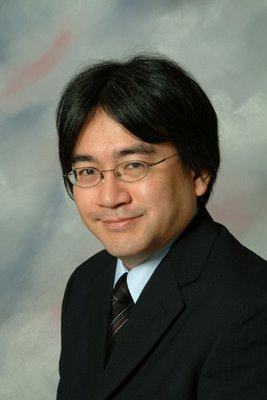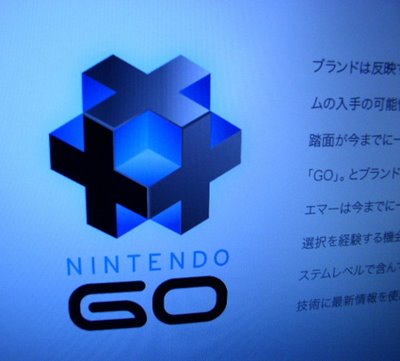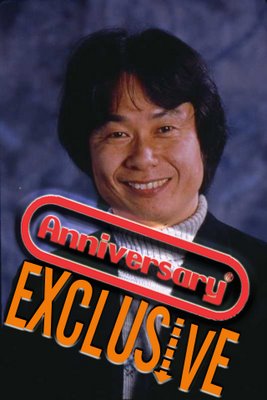
Welcome to my anniversary exclusive. It is hard to imagine, but in only a few days my page view counter will hit the one million mark. I would like to thank all my readers again for making this blog possible. And what better way to celebrate this than an exclusive interview with Shigeru Miyamoto himself, Nintendo´s head designer and manager of the reknowned EAD studio.
I have conducted the interview on behalf of three news outlets and am currently unable to post the transcript. I will do so soon. In the meantime you may read my first article (in German) at
Der Spiegel, a weekly German magazine (comparable to Newsweek or The Economist). I will translate the article soon. Please check the
Google translation in the meantime.
You have probably heard the big news about Miyamoto confirming that
´Zelda: Twilight Princess´ will have special controller features when played on the Revolution. In fact, Miyamoto confirmed this piece of information exclusively to me, much to everyone´s surprise. Nintendo of Europe then had to react quickly and posted a press statement before I could write the article. Nevertheless, this bit of information was revealed exclusively to me, writing on behalf of
Der Spiegel. Here´s the translated excerpt from the article:
´Legend of Zelda: Twilight Princess´ will still be released for the current console, the Gamecube. A sword fight however would be more than suitable for the Revolution controller. As we reported already yesterday, Miyamoto let this one slip, much to the PR people´s surprise. "Let me put it this way," Miyamoto says. "When you are going to play ´Twilight Princess´ on the Revolution, you are going to be able to use the Revolution controller. I can confirm that you can shoot arrows by utilizing the remote control."
In order to illustrate, he points his hand at us and fires a few imagniary arrows in our direction. He probably forgot that this piece of information was supposed to remain a secret.
If you can, please check out the entire article. As I said before, I will post the transcript as soon as my other articles are online.
EDIT My second article is now online. It was written for the online part of Die Zeit, Germany´s most reputable weekly paper. If you are able to read German, please check it out. I will now post the interview as soon as I can.
EDIT Thank you all for your patience. Here is the interview in full. Please be advised that Miyamoto´s answers (through a translator) are verbatim. Not all parts make perfect sense. For a number of answers, I will consult Japanese native speakers in due time and, hopefully, will be able to clarify a number of points.On a legal note: You are free to republish this entire interview or quote from it, as long as you do not alter the content in any way and you also absolutely must cite the appropriate sources by copying and pasting the following HTML code alongside without alteration:
Sources: <a href=http://www.spiegel.de/netzwelt/netzkultur/0,1518,406471,00.html>Der Spiegel</a>, <a href=http://zuender.zeit.de/2006/12/nintendo>Die Zeit</a>, <a href=http://www.rtl2news.de>RTL II News</a>
The interview itself has been conducted on behalf of these three major news outlets. Please appreciate that there are copyright issues attached to this interview and, as a consequence, failure to give appropriate credit might result in legal action. Thank you.
What does receiving the French knighthood mean to you? Do you feel that the French are more open-minded to accept games as a part of their culture?
When I first heard about the possibility of receiving this important award, I was kind of embarrassed to tell you the truth. I had been making videogames for so many years but all the time was working with so many friends (…)
Since the French government is now going to recognize videogames as part of their culture, I thought it would be good for the whole industry if I received the award.
A prestigious cultural award for videogames - even nowadays that´s an unlikely combination to a lot of people. Are videogames really more than just mass entertainment and a way to pass the time? Surely, videogames cannot compete with books, on a cultural level?
I think it’s hard to compare videogames with any existing arts or culture actually. I think videogames are something brand new. For example if we look at the so-called arts, literature as a whole, those are created by some authors and painters, but when it comes to the recipients, all we are supposed to do is listen to the music, looking at the arts, reading the books. That’s all we are supposed to do. It’s just one way. But what we are dealing with here is videogames, which is interactive entertainment, which is an unprecedented form, I believe.
What I’m trying to do is make players as creative as possible. More specifically we want players to think about what next move he or she is going to do. So this kind of interaction as a whole is going to make the whole videogames. What we are offering is just part of that. We need the active participations from the users. So that’s why I say that videogames are very different. And a pretty new format which has no comparison with any existing format.
I understand that some people believe that it’s just a waste of time. But for those who are actually playing with the videogames they are having some significant importance because they are trying to be creative, they are going to become artists themselves by playing with videogames. If we are talking about that aspect of videogames, I think we can call it part of the culture already.
With Mario, Zelda and Donkey Kong, you created some of the best known franchises. But that was two decades ago. Your most recent characters, the flower people in the quirky game Pikmin for example, failed to have the same impact. Is the cutie-pie appeal dead?
For example, when I think about the reason why Mario is enjoying such longevity in terms of sustained popularity by so many people all around the world. I think it’s simple. The reason is that Mario has appeared in videogames, which is very interesting for the game players.
If we created characters called Mario as itself and tried to advertise that as the character for nothing, then we will not have this success with the popularity of Mario. Mario has been enormously popular all around the world for twenty or so years. Simply because people can relate the new videogames with the name of Mario. Because whenever we come up with a new format of hardware or new applications to make existing hardware more unique, we are trying to make Mario as the character which is appearing in this kind of software application.
I think people relate to Mario as if it is the character to show you the new digital entertainment and actually we have been trying to do that intentionally. So if you ask me if there is no competition with Mario as the character, it’s hard to tell. Mario as the character itself I do not think has been that popular. Mario has never appeared in those kind of software titles. My point is that I always try to cherish Mario as a character, so he always trying to do with best acts when I request him to appear in a new digital entertainment formats.
The latest Mario game, the new Super Mario Bros. for DS, is basically a side scrolling Jump ’n Run. Why return to the good old times of 2D platformers?
I think that’s a tribute to the hardware, namely to the DS-Platform. With the success of Nintendogs and Brain Training and many other unusual software application - we call them the Touch Generation titles - a number of the people who are purchasing DS are the people who have not played with videogames before. For them Nintendo DS has turned out to be their very first videogames machine in their lives that they can buy.
Looking at its size, the Revolution is hardly bigger than the original Xbox controller. Just how portable is it going to be? Where will Revolution take gamers?
I don’t think that we can call Revolution a portable videogame machine. I don’t know how to characterize it. Just an example: in Japan, whenever electronic makers are trying to advertise their refrigerator product line, they hardly talk about how many things the fridge can contain or how powerful the cooling function is. They are talking about how less electric consuming the average is. And another example from racing, Honda for one is inventing more efficient engines. Yet there most profitable machine is not a racing machines or their engines after all, it’s a compact car called Fit.
Similar things can be said about console games machines. Of course, in terms of current technologies, Nintendo could have made Revolution somewhat different machines. In other words we could make it a state-of-the-art with beefed up processing power. But we have not opted to take that course. Nintendo has been thinking in terms of how each family member is thinking about videogames nowadays. We wanted Revolution to become the machine that each family member feels like touching it, want Revolution to sit comfortably next to their TV sets. And to do that we wanted Revolution to be compact and less noisy and we want Revolution to have the look that would not intimidate people, but rather encourage people to touch it.
You yourself said that there is still a last secret to the console. There are even rumours of 3D visors and projectors. Just how big is that last secret? Will the console really be able to deliver, given such high expectations?
I am sorry that I can’t tell you that. What I can tell you is that revolution is not going to be that kind of difficult machine to handle. Whenever we are talking about secrets, the secrets created in order to let people feel like I can touch it, I want to play with it. That’s all regardless of their past gaming experiences. The secrets are always there for them to feel that this is a machine; I really want to play with it.
At the recent tourism fair in Germany, the travel industry is gearing up to cater for the pensioners, giving them names like Silver Travellers. You are targeting Silver Gamers with your puzzle game Brain Training. Is this a one-off or do you want to see the revolution find its way into old people’s homes?
In Japan we are already having that kind of phenomenon, whereby a lot of the elderly citizens are already enjoying Brain Training, Europe is yet to have that. But soon you are going to have a similar experience and we are hopeful that European people, including senior citizens, will be enjoying the Brain Training software application. In Japan that is already the case. Starting from Brain Training and Nintendogs, now Animal Crossing is selling extremely well. Against the original sales expectation, Animal Crossing is enjoying four times more the original expectatons, topping two million sales in a few weeks of the launch.
Now, talking about Revolution, because Revolution is a home console, which is supposed to be connected to a tv set, which is supposed to be in the living room of each family household, we really hope that we can do even more than what Nintendo DS has been able to do, so everybody feels comfortable for the Revolution to be connected to an ordinary tv set all the time.
The TGS trailer shows a sword-fighting game. Will we be able to swing the master sword at launch? Revolution controller functionality has been practically confirmed for Zelda twilight princess.
Legend of Zelda: Twilight Princess is GameCube software and GameCube software can run on the Revolution. Utilizing the new Revolution Controller you may be able to have some new sensation. Even in comparison when you are trying the Twilight Princess on the GameCube.
Let me get this straight. You are saying that Legend of Zelda: Twilight Princess will have Revolution controller functionality?
Let me put it this way. When you are going to play Twilight Princess on the Revolution, you are going to use the Revolution-Controller. I can confirm that you can shoot the arrow by utilizing the game remote control.
Sources: Der Spiegel, Die Zeit, RTL II News
Thanks to: Product_Number_18
